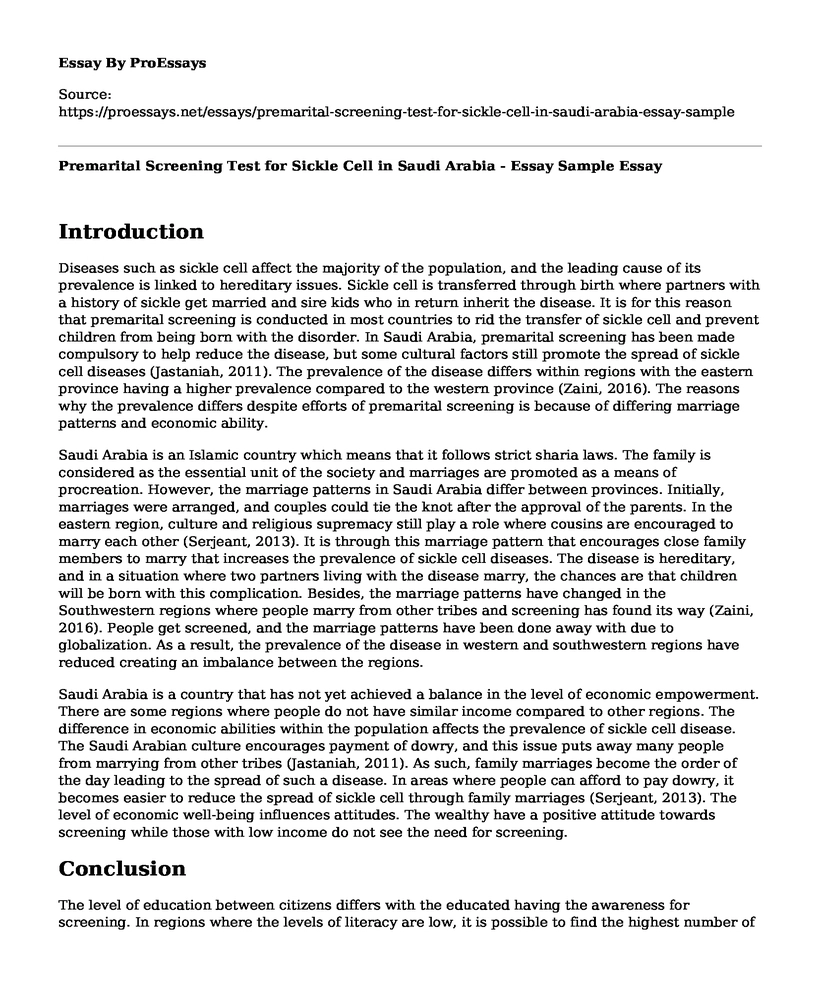Introduction
Diseases such as sickle cell affect the majority of the population, and the leading cause of its prevalence is linked to hereditary issues. Sickle cell is transferred through birth where partners with a history of sickle get married and sire kids who in return inherit the disease. It is for this reason that premarital screening is conducted in most countries to rid the transfer of sickle cell and prevent children from being born with the disorder. In Saudi Arabia, premarital screening has been made compulsory to help reduce the disease, but some cultural factors still promote the spread of sickle cell diseases (Jastaniah, 2011). The prevalence of the disease differs within regions with the eastern province having a higher prevalence compared to the western province (Zaini, 2016). The reasons why the prevalence differs despite efforts of premarital screening is because of differing marriage patterns and economic ability.
Saudi Arabia is an Islamic country which means that it follows strict sharia laws. The family is considered as the essential unit of the society and marriages are promoted as a means of procreation. However, the marriage patterns in Saudi Arabia differ between provinces. Initially, marriages were arranged, and couples could tie the knot after the approval of the parents. In the eastern region, culture and religious supremacy still play a role where cousins are encouraged to marry each other (Serjeant, 2013). It is through this marriage pattern that encourages close family members to marry that increases the prevalence of sickle cell diseases. The disease is hereditary, and in a situation where two partners living with the disease marry, the chances are that children will be born with this complication. Besides, the marriage patterns have changed in the Southwestern regions where people marry from other tribes and screening has found its way (Zaini, 2016). People get screened, and the marriage patterns have been done away with due to globalization. As a result, the prevalence of the disease in western and southwestern regions have reduced creating an imbalance between the regions.
Saudi Arabia is a country that has not yet achieved a balance in the level of economic empowerment. There are some regions where people do not have similar income compared to other regions. The difference in economic abilities within the population affects the prevalence of sickle cell disease. The Saudi Arabian culture encourages payment of dowry, and this issue puts away many people from marrying from other tribes (Jastaniah, 2011). As such, family marriages become the order of the day leading to the spread of such a disease. In areas where people can afford to pay dowry, it becomes easier to reduce the spread of sickle cell through family marriages (Serjeant, 2013). The level of economic well-being influences attitudes. The wealthy have a positive attitude towards screening while those with low income do not see the need for screening.
Conclusion
The level of education between citizens differs with the educated having the awareness for screening. In regions where the levels of literacy are low, it is possible to find the highest number of cases of sickle cell (Zaini, 2016). On the contrary, individuals who are educated have that awareness on the need to get screen before marriage. Besides, the knowledge gained through learning leads to a change of attitude which helps in doing away with practices that promote the spread of the disease. These factors are still existing in Saudi Arabia and are the major contributors to the high prevalence of sickle cell disease.
References
Jastaniah, W. (2011). Epidemiology of sickle cell disease in Saudi Arabia. Annals of Saudi medicine, 31(3), 289.
Serjeant, G. R. (2013). The natural history of sickle cell disease. Cold Spring Harbor perspectives in medicine, a011783.
Zaini, R. G. (2016). Sickle-cell anemia and Consanguinity among the Saudi Arabian population. Arch Med, 8(3), 3-15.
Cite this page
Premarital Screening Test for Sickle Cell in Saudi Arabia - Essay Sample. (2022, Aug 15). Retrieved from https://proessays.net/essays/premarital-screening-test-for-sickle-cell-in-saudi-arabia-essay-sample
If you are the original author of this essay and no longer wish to have it published on the ProEssays website, please click below to request its removal:
- Paper Example on Evidence-Based Health Care
- Collaboration and Leadership for Effective Emergency Management - Article Analysis Essay
- Skin Cancer Prevention Based on Sun Awareness Paper Example
- Exploring the Social Construction of the Human Body - Essay Sample
- Diabetes Mellitus: The Growing Need for DNEs - Research Paper
- Essay Sample on Human Genome Project: From Cancer Understanding to Automated Sequencing
- Essay on Mobile Phlebotomy Service: Accommodating Patients with Disabilities and VIPs







